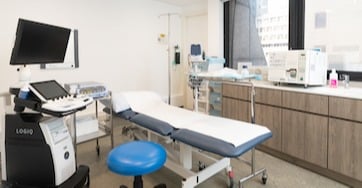It’s important to attend routine antenatal screening tests during pregnancy to check for anything that may cause a problem during or after birth. Several antenatal tests are available on the market, and at OT&P Healthcare, we offer screening tests according to international recommendations.
We believe every pregnant woman deserves to have non-biased information regarding her care and childbirth options – so we have compiled a list of some standard & common antenatal screening tests you may encounter.
|
Standard tests
Other Tests |
Standard antenatal tests
Below are the standard tests that pregnant women will take, and that we provide at OT&P:
Complete blood count
This test assesses all components of your blood to look for anaemia, platelet counts, thalassemia and more. It’s usually done at the first visit, then at 28 weeks. The key things that doctors will look out for are your haemoglobin levels (red blood count) – to ensure that you carry enough iron and oxygen around your body and to your baby. Additionally, blood results can tell doctors if any underlying diseases are present.
Blood type and rhesus blood group
This test will determine your blood group (ABO) and rhesus status. Your genes fix the rhesus blood group and have two outcomes:
- Rhesus positive: a protein found on the surface of your red blood cells.
- Rhesus negative: you don’t have the antigen on your blood cells.
When negative, your pregnancy will likely need extra monitoring to ensure you and your baby are developing healthily.
Antibodies
The antibodies test typically looks for atypical antibodies in the blood and is again done at the first visit and later at 28 weeks.
The reason we screen for atypical antibodies is that they have the potential to cause harm to you or your developing baby.
Syphilis screening
All women should be screened for syphilis during their pregnancy. Syphilis is a bacterial infection that can harm the baby’s health and development but with little to no symptoms. Syphilis in pregnant women can cause various issues, such as miscarriages, stillbirths, or the baby’s death after birth. Fortunately, it can be treated through medication but you should do so soon!
Hepatitis B
This screening looks to see if the mother has hepatitis B. Although when positive, it doesn’t cause any problems during pregnancy (for mother and baby), your baby will need to be protected from the infection after birth – especially during breastfeeding.
HIV
Human Immunodeficiency Virus (HIV) is a virus that affects the body’s ability to fight foreign infection. Untreated and undetected can lead to AIDS (acquired immunodeficiency syndrome). A pregnant woman can pass HIV to their baby during pregnancy, birth or through breastfeeding – so it’s essential to screen for it and treat it, as with treatment, the chance of the baby being born with HIV is less than 1 per cent.
Rubella
Testing for rubella will ensure pregnant women have enough rubella antibodies to protect them and their babies against infection. Anyone not vaccinated against rubella can get the disease and could harm the baby.
Therefore, women planning to become pregnant should check with their doctor and ensure they are vaccinated before getting pregnant. If unvaccinated and already pregnant, it’s usually advised that they do so after delivery.
Other antenatal screening tests
These are some of the more common tests done in pregnancy. Depending on your circumstance, other tests may be necessary during your pregnancy. In these situations, your doctor will discuss the rationale and process for the recommended tests.
Screening for Down Syndrome (trisomy 21)
We recommend non-invasive prenatal testing (testing for baby’s DNA in the mother’s blood) due to its higher sensitivity and specificity. The test can detect more than 99% of Down Syndrome babies. Trisomy 13 and 18 (Patau and Edwards’ syndrome) will also be screened as part of this screening.
It’s also possible to detect the baby’s gender with this test, so if you want to keep it a surprise, please inform your doctor.
Ultrasound
A high-quality first-trimester ultrasound within the initial 14 weeks of pregnancy is recommended to ensure the baby's size is correct at this gestation. This is essential for women with irregular menstrual cycles to ensure the estimated delivery date can be accurately calculated.
A structural ultrasound can be done at 20–22 weeks to examine the baby’s organs in detail. At its best, an ultrasound at this gestation can detect up to 70% of abnormalities. But you should also tell your doctor if you have any personal or family history of congenital conditions.
Thyroid function
Most women will find they are extremely tired in early pregnancy. In some situations, we recommend screening the thyroid function to ensure they do not lack thyroid hormones, which will affect the baby’s brain growth. This screening (along with urine culture for infections) will also be done if there is excessive vomiting (morning sickness) in pregnancy.
Oral Glucose Tolerance Test
This is a screening test for diabetes in pregnancy. Most women will have it done between 24 to 28 weeks gestation. Women with certain risk factors must have it done a second time earlier in the pregnancy (around 16 weeks).
Group B Streptococcus
This screening test is done at 35 to 37 weeks gestation to look for a bacterium called Group B Streptococcus. This bacterium typically resides in 25% of women and does not affect them. However, after the waters break or when in labour it can infect the baby and hence require antibiotics.
Pregnancy support in HK
At OT&P, we advocate for tests with higher sensitivity to reduce a mother’s anxiety and unnecessary invasive testing. If you are looking for advice or pregnancy support, please feel free to contact our team.
We also provide a range of maternity packages tailored to giving birth in Hong Kong. We’ve carefully designed our packages to ensure peace of mind from the prenatal/antenatal to the postnatal stages of your pregnancy. Packages can also be customised and tailored according to your individual needs.

 Central General Practice
Central General Practice
 Repulse Bay
Repulse Bay
 Clearwater Bay
Clearwater Bay
 BodyWorX Clinic
BodyWorX Clinic
 Central Specialist Clinic
Central Specialist Clinic
 MindWorX Clinic
MindWorX Clinic
 Partner Clinics
Partner Clinics
 Family Clinic
Family Clinic
 OT&P Annerley Midwives Clinic
OT&P Annerley Midwives Clinic


